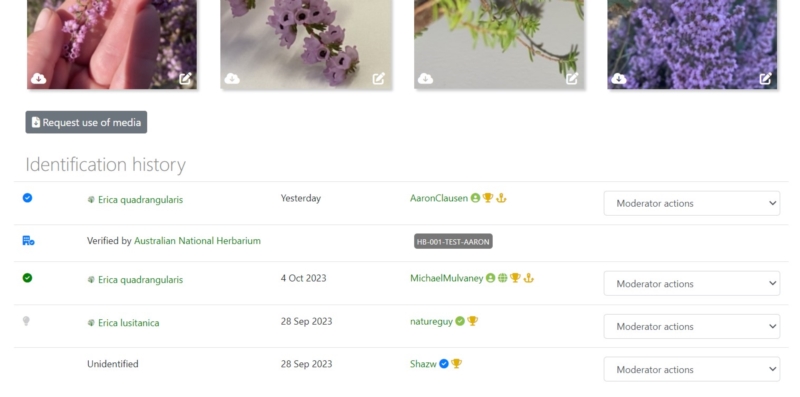EVEN HIGHER formal level of record verification!
Posted by AaronClausen
9 Jan 2024
Hi Mapping Legends,
To further build on NatureMapr's mission to provide the highest quality biodiversity information through to decision makers, we have just rolled out a new feature that has been designed in conjunction with Paul Downey, Steve Taylor and Michael Mulvaney.
Despite our community being fortunate to have access to so many leading plant and animal experts, sometimes a record still needs to be sent off to a formal collection institution (like the Australian National Herbarium or Australian National Insect Collection) for formal verification, where it is then allocated a unique specimen ID and is added to a collection of physical specimens.
This is the highest level of record identification possible on NatureMapr and raises the bar even higher for the provision of high quality biodiversity information to desision makers.
Using this record as an example to demonstrate
This specimen was dropped off at the national herbarium for formal verification.
A relevant moderator then clicked the new Verify by button to record the results of the Herbarium's verification:

The moderator then selected the relevant collection institution from the list and entered in the unique specimen ID provided by the herbarium:

The record's identification audit trail now displays the formal verification status provided by the National Herbarium along with the unique specimen ID of the record:

This information will in turn be fed through to NatureMapr's trusted downstream data parners such as the government.
Thanks to Paul Downey for his fantastic assistance in designing this new functionality.
Cheers
Aaron.
6 comments
Agree though that confirmation of ID via direct inspection by Herbarium has to be the pinnacle of verification.
In my experience, there is a considerable time lag ( months ) between submitting a pressed and prepared herbarium specimen, and it being in the Herbarium system. Thus there would be a two-stage entry process, not the simple one stage implied In the description above. The Herbarium has various processing stages ( cleaned, verified, catalogued etc). Plus, I agree with pinnaCLE about quality of material “dropped off” for ID.
I already do the opposite process, and have done for about 3 years. That is, when I submit collected and prepared specimens to the Herbarium, as well as providing all the collecting details, I include the CNM sighting number as source of supplementary (photographic ) visual evidence.
What I have done since the late 1980s as a teenager lodging plant specimens with the Melb. Herbarium (MEL).
If the submitted sample is fresh, it will not be in good condition if it has to wait weeks to get to the appropriate person.
Or should all submitted samples be pressed by the submitter?
Is there a CNM moderator who is an insider for the Herbarium - this person could be notified via the CNM messaging.
